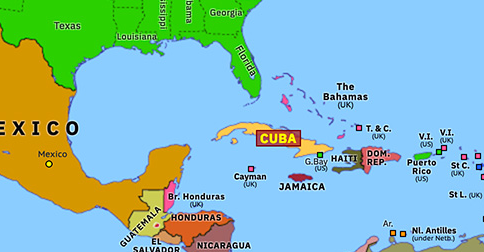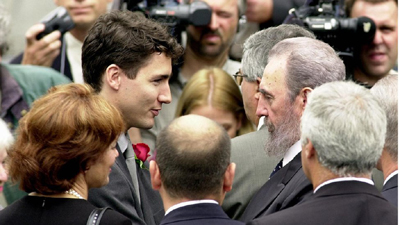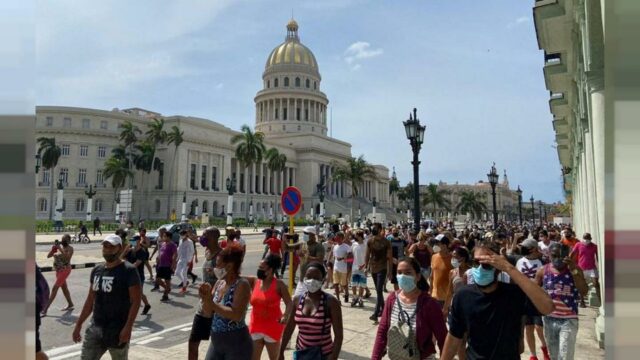Thursday July 15, 2021 | NATIONAL
by Jalen Codrington | Island Social Trends
Last weekend, the Republic of Cuba was shaken by protests over food shortages, high prices, and overall mismanagement from the country’s communist government.
When asked by the media in Canada to condemn the actions of the Cuban government, Prime Minister Justin Trudeau’s response was seen as cautious. “Canada has always stood in friendship with the Cuban people,” Trudeau said on Tuesday. If nothing else, there is a strong tourism trade with Canada that Cuba’s economy draws strength from.
An unspecified number of demonstrators were arrested, just outside of the Cuban capital of Havana, and one killed during an altercation with police. These demonstrations are extremely unusual in the island state where public dissent tends to be not tolerated by the government. Network service was reportedly interrupted to prevent protestor organization. Cuban President Miguel Díaz-Canel accused Americans of using social media to instigate unrest in the streets.
Background:
The Cuban economy plummeted in the early 90’s when the collapse of the Soviet Union deprived the island nation of its trade allies. The country saw a rebound in the early 2000’s when Venezuela started selling them discounted petroleum. But after the 2008 Recession, experts say Cuba never really recovered.

Government in Havana blames the situation on the decades-old U.S. embargo that was tightened by the Trump administration (and yet to be lifted by his Democrat successor, despite words of sympathy). But also an important factor in the country’s wealth stagnation is the centrally planned economy. The government owns and operates most industries. The country also has no sales tax, income tax, corporate tax, or value added tax. They do have a tax on a business’ number of employees which tends to discourage job growth.
In the past 16 months, the lack of tourism due to the COVID pandemic has all but crippled Cuba’s economy. Power shortages during the tropical summer heat have only exacerbated the situation. President Diaz-Canel reportedly said Monday that having so many people infected and isolated is hurting the economy by forcing the island to dedicate its limited electricity resources toward hospitals and recovery centers.
Opposition leader responses:
- Conservative: While Trudeau was treading lightly, Conservative Leader Erin O’Toole issued a statement declaring that he and his party stand with the peaceful protestors taking to the streets over a lack of freedom and basic necessities. “The struggle for freedom that the Cuban people are fighting for matters. They deserve to live a life free of oppression, where they have access to the basic democratic rights and amenities we so often take for granted in a country such as our own,” O’Toole said, adding in pre-election mode: “We can’t afford more of Mr. Trudeau’s glowing admiration for dictatorships.”
- NDP: Meanwhile, Jack Harris, federal NDP critic for Foreign Affairs, said in a statement: “New Democrats affirm our support for the fundamental rights of freedom of expression and assembly and renew our call to end the US embargo of Cuba that has led to shortages of essential goods. In April 2020, I wrote a letter to the Foreign Affairs Minister calling on the Government of Canada to call on the US to ease their embargo on Cuba and allow all medical supplies and humanitarian assistance into the country. Yet, the Liberal Government has remained silent on the issue.”
A change in tone
Today, July 15, Trudeau has since adapted his tone, condemning the actions of Diaz-Canel:
“We’re deeply concerned by the violent crackdown on protests by the Cuban regime,” Trudeau said after making an aerospace announcement in Montreal on Thursday. “We condemn the arrests and repression by the authorities of peaceful demonstrators. Cubans have the right to express themselves and to have their voices heard.”
Canada & Cuba:
Throughout the 1959 revolution which swept Fidel Castro to power, and almost brought the U.S. and Russia to nuclear war, Canada maintained its ties to Cuba. Before the pandemic hit in 2020, Canada had apparently sent more tourists to the island than any other country.

It was seen in the past that then-Prime Minister Pierre Elliott Trudeau shared a philosophical approach to governance with Fidel Castro. The long-time Cuban leader was a pallbearer at Pierre Trudeau’s funeral in 1984.
Upon the death of Cuba’s president, Justin Trudeau had this to say:
“It is with deep sorrow that I learned today of the death of Cuba’s longest serving President. Fidel Castro was a larger than life leader who served his people for almost half a century. A legendary revolutionary and orator, Mr. Castro made significant improvements to the education and healthcare of his island nation.”
Trudeau was greeted by the current Cuban leader at the airport during a 2016 visit to Cuba.
A statement from the Global Affairs Canada website reads: “Canada and Cuba enjoy a broad and diverse relationship built on a long history of mutually beneficial engagement, important and growing economic and commercial relations, and strong people-to-people ties across a wide range of sectors and interests.”



